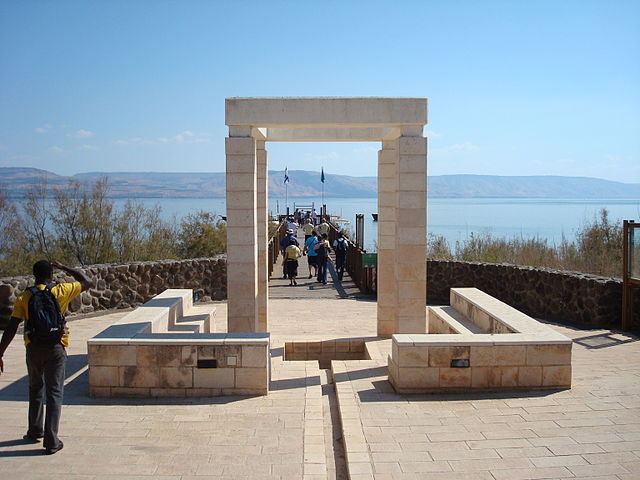And they went into Capernaum; and immediately on the Sabbath he entered the synagogue and taught. And they were astonished at his teaching, for he taught them as one who had authority, and not as the scribes. And immediately there was in their synagogue a man with an unclean spirit; and he cried out, “What have you to do with us, Jesus of Nazareth? Have you come to destroy us? I know who you are, the Holy One of God.” But Jesus rebuked him, saying, “Be silent, and come out of him!” And the unclean spirit, convulsing him and crying with a loud voice, came out of him. And they were all amazed, so that they questioned among themselves, saying, “What is this? A new teaching! With authority he commands even the unclean spirits, and they obey him.” And at once his fame spread everywhere throughout all the surrounding region of Galilee. — Mark 1:21-28
Reflection
Those who attended the synagogue at Capernaum were used to hearing the scribes preach. However, the scribes focused on legalism, on external observances and on teaching man-made traditions. They did not seek the needy out as Jesus did, to love, heal and teach them. Like the priests and the Pharisees, the scribes were corrupt and proud. They despised the common people and avoided them. Jesus, however, loved them and was moved with compassion at their plight (Matt 14:14). Jesus taught with unparalleled authority, but he used his authority to transform the lives of the poor and needy. Christian educators should seek to be such masters of the material they teach that they communicate it with authority, yet that authority must be motivated by loving concern for the welfare of their students. They must teach for the good and for the blessing of others.
Some years ago, Dr Karl Menninger, noted doctor and psychologist, was seeking the cause of many of his patients’ ills. One day he called in his clinical staff and proceeded to unfold a plan for developing, in his clinic, an atmosphere of creative love. All patients were to be given large quantities of love; no unloving attitudes were to be displayed in the presence of the patients, and all nurses and doctors were to go about their work in and out of the various rooms with a loving attitude. At the end of six months, the time spent by patients in the institution was cut in half.
Read Karol Ladd’s The Power of a Positive Woman (2002 New York: Howard Books) to find out more about Dr Menninger’s successful use of love as a therapeutic tool, and how others such as Mother Teresa used the same approach to demonstrate God’s compassion for the needy.
Questions
What practical steps can we take to become more like Jesus by teaching with the needs of our students as our priority?
How can we balance authority with love in our interactions with students?
Prayer
Dear Lord, grant us your truth in our minds and your love in our hearts as we seek to lead others to understanding and to wisdom. Help us to live and teach so winsomely that they will be inspired to search for knowledge and truth and to dedicate themselves to the service of their fellows. Help us to live with such quality of life that they never doubt that we seek only their highest good. Help us to give ourselves to others as Jesus gave himself for us. This we ask in Jesus’ name. Amen.
Image: At Capernaum, courtesy of Alex Eleon via Wikimedia Commons: https://commons.wikimedia.org/wiki/Category:Capernaum_harbor#/media/File:At_Capernaum.jpg
![]() Note: Part of both the Scholar’s Compass series and Robert Brodie’s Teaching With Authority series at the Emerging Scholars Network Blog. Find Part 1 here.
Note: Part of both the Scholar’s Compass series and Robert Brodie’s Teaching With Authority series at the Emerging Scholars Network Blog. Find Part 1 here.
Robert W. Brodie, D.Phil., is a post-graduate supervisor for MTh and PhD degrees and an academic assessor for the South African Theological Seminary (SATS) in Johannesburg, South Africa, and Living Word Bible College in Pretoria, South Africa. He and his wife Edna have recently relocated to New Zealand to join their daughter Patricia in Invercargill. Jennifer-Joy, their eldest daughter, lives in Australia, while Catherine, their youngest daughter, is still in South Africa. Dr Brodie continues to facilitate distance education courses for SATS and to supervise SATS post-graduate students on a part-time basis from New Zealand. He has edited three theological books in the past three years, contributed a chapter to a theological work and is currently writing two chapters for a further theological handbook.


Leave a Reply